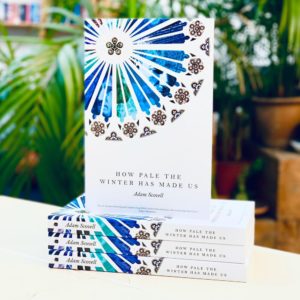Novelist, critic and film-maker, Adam Scovell is a prodigious young talent. In How Pale the Winter Has Made Us he introduces us to Isabelle, a young British academic adrift and alone in Strasbourg. She overwinters in this rainy corner of north-eastern France trying to come to terms with the recent suicide of her father and ignoring the frantic messages from her mother, from whom she is estranged, and her employer, the new post with whom she has failed to take up. Isabelle stays in her partner’s flat while he travels in Latin America. Occasionally he checks in with her for phone conversations that are awkward and stilted on both sides.
 Whilst Isabelle acts as Scovell’s protagonist in this book, his main character is the city of Strasbourg itself and the reader is led on a topographic and temporal journey through its streets. The weight of history sits heavily upon the city. We learn much about Gutenberg, Goethe, Gustave Doré, Jean Arp and other historic figures connected with Strasbourg. But what we pick up about Isabelle and her back story is only minimal. Other figures in her life are even sketchier: in Isabelle’s first-person narrative her father was a failed painter, her mother is a ‘harridan’ and her partner does not even warrant a name.
Whilst Isabelle acts as Scovell’s protagonist in this book, his main character is the city of Strasbourg itself and the reader is led on a topographic and temporal journey through its streets. The weight of history sits heavily upon the city. We learn much about Gutenberg, Goethe, Gustave Doré, Jean Arp and other historic figures connected with Strasbourg. But what we pick up about Isabelle and her back story is only minimal. Other figures in her life are even sketchier: in Isabelle’s first-person narrative her father was a failed painter, her mother is a ‘harridan’ and her partner does not even warrant a name.
She wanders the streets of Strasbourg dragging the burden of her psychological disintegration around with her. One step behind the figure of the Erl-King shadows her; whether he is a supernatural being or an expression of her shattered psyche the reader is left to decide. Isabelle scours the city’s flea markets for old postcards and researches its history online trying to piece together the puzzle of the Franco-German enigma that is Strasbourg. As we share her journey we are led to wonder whether all her searching will tip her over the edge into complete breakdown, or if it will eventually contribute to a process of integration and healing.
How Pale the Winter Has Made Us by Adam Scovell is published on 13 February 2020 by Influx Press. Image and review copy courtesy of the publisher.
